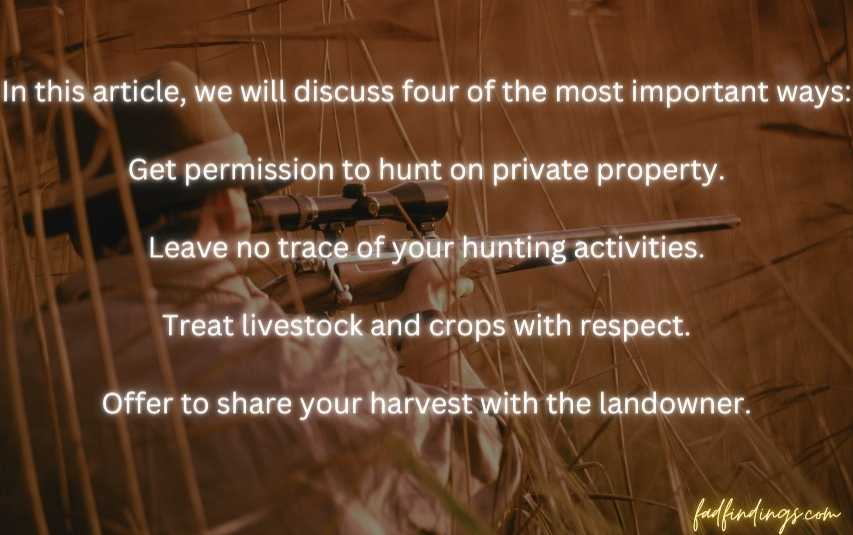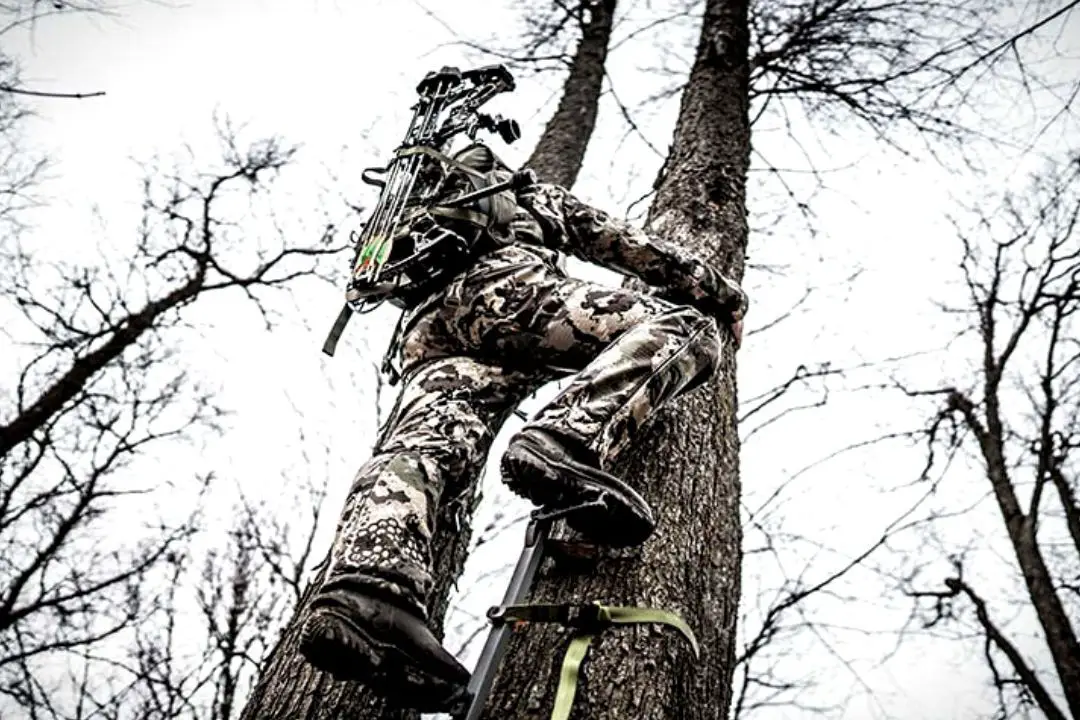How Would a Responsible Hunter Show Respect for a Landowner
Hunters have a responsibility to be respectful of landowners when hunting on private property. Our article will discuss the importance of showing respect for landowners and provides tips on how to do so.
As an experienced hunter who deeply cherishes the natural world, I understand the essence of responsible hunting and the importance of showing respect to landowners who generously grant us access to their private properties.
Hunting is not merely a sport and developing only your hunting skills is not enough. It is a way to connect with nature, practice wildlife management, and contribute to conservation efforts.
In this article, I'll share invaluable insights on how we, as ethical hunters, can demonstrate respect for landowners while enjoying our passion for hunting.

The Harmony Between Hunting and Respect for Landowners
Hunting offers a profound opportunity to immerse ourselves in the wilderness and embrace the beauty of the great outdoors. However, this privilege comes with great responsibility – the responsibility to respect landowners and their property.
As hunters, we should always strive to build positive relationships with landowners. By doing so, we ensure that hunting remains a sustainable and enjoyable activity for generations to come. Here are four essential ways to show respect for landowners:
Get Permission to Hunt on Private Property
Hunting on private property is a privilege, not a right. Seeking permission from landowners is the first and most crucial step in demonstrating respect for their rights and property.
By obtaining permission, we acknowledge that we are guests on their land and that we value their consent. It is essential to approach landowners with humility and sincerity when requesting permission to hunt.
Approach to Securing Permission
Remember, we are ambassadors for responsible hunting, so
- Be Polite and Courteous: Introduce yourself, explain your passion for hunting, and express gratitude for the opportunity to seek permission.
- Offer Information: Share your hunting license and demonstrate your knowledge of wildlife management and hunting regulations. This will assure the landowner that you are a responsible and law-abiding hunter.
- Explain Your Intentions: Describe your ethical hunting practices and reassure the landowner that you will treat their property with the utmost respect and care.
Accepting "No" with Grace
In some cases, landowners might decline our request, and that's okay. A graceful acceptance of their decision shows maturity and respect.
We should never argue or push our case; instead, thank them for their time and look for alternative hunting opportunities.
Leave No Trace of Your Hunting Activities
A responsible hunter understands the importance of leaving the land as they found it. When hunting on private property, we must ensure that we minimize our impact on the environment and the landowner's property.
The Art of Responsible Cleanup
- Dispose of Waste Properly: Carry out all trash, including spent cartridges and food wrappers. Leave nothing behind that could harm the environment or inconvenience the landowner.
- Respect Wildlife Habitats: Avoid disturbing nests, burrows, or natural habitats. Preserve the balance of the ecosystem by observing wildlife from a distance.
- Repair Damage: If accidental damage occurs, report it to the landowner immediately and offer to cover repair costs.
Gate Etiquette
As we traverse through gates on private property, it is crucial to leave them as we found them. Closing gates behind us is a sign of respect for landowners, as it prevents livestock from straying and ensures safety on their property.
What if You Damage the Landowner's Property?
Mistakes can happen, but it's essential to take responsibility for any damage caused. In the event of unintentional property damage, notify the landowner as soon as possible. Express your regret, and offer to make reparations or compensate for the damage.
This display of honesty and accountability are marks of a true ethical hunter and will strengthen the trust between hunters and landowners.
Treat Livestock and Crops with Reverence
Private properties often host livestock and crops, and as ethical hunters, we must treat these living beings and livelihoods with the utmost respect.
Protecting Livestock and Crops
- Stay Away from Livestock: Avoid approaching or interacting with livestock while hunting. Do not disturb their grazing areas or water sources.
- Stay Clear of Crops: Respect the landowner's crops by staying away from fields and avoiding trampling plants.
Eliminating Attractants
Leaving food, bait, or attractants is not only irresponsible but can also cause damage to the property and its inhabitants. Let us be mindful of our actions to protect the interests of landowners.
What if You Observe Damage to Livestock or Crops by Wildlife?
Inform the landowner immediately about any observed damage. Collaborate with them to find a solution that ensures the safety of their livestock and minimizes the impact on your hunting activities.
Offer to Share Your Harvest with the Landowner
As a responsible hunter, showing gratitude to landowners is a cherished tradition. Offering to share our harvest is a heartfelt gesture of appreciation for their generosity.
- Show Appreciation: Express your thanks for the landowner's generosity in allowing you to hunt on their property.
- Offer the Bounty: Present your harvested game in a clean and presentable manner. Offer it as a gift, acknowledging the landowner's role in wildlife conservation.
As a responsible hunter, you need to understand the difference between Conservation & Preservation
Frequently Asked Questions
Seeking permission can be nerve-wracking. The fear of rejection lingers, and you worry about damaging property unintentionally.
Fear not! We've got you covered with essential tips and tactful ways to ask for permission respectfully. Embrace respect, embark on a journey of ethical hunting, and unlock the door to cherished hunting grounds through trust and responsible behavior.
How can I respectfully ask for hunting permission, even if I'm a first-time visitor?
Being a first-time visitor doesn't mean you can't make a positive impression. Show humility and politeness when requesting permission. Let the landowner know that you're aware of the responsibility that comes with hunting on private property.
Share your excitement about exploring their land and assure them that you'll follow their guidelines and respect their property as if it were your own.
What are some practical tips to dispose of waste properly while hunting on private land?
Dispose of waste responsibly by bringing along garbage bags to collect all your trash. Avoid leaving any litter behind, even biodegradable items, as they can disrupt the ecosystem and harm wildlife. Pack out what you pack in, showing your commitment to leaving the land clean and undisturbed.
How do I preserve wildlife habitats and avoid disturbing nests or natural habitats during my hunting expedition?
Respecting wildlife habitats is crucial to maintaining biodiversity. Keep a safe distance from nests, burrows, and other natural habitats to prevent unnecessary disturbance.
Use binoculars or spotting scopes to observe wildlife from afar, allowing them to go about their daily activities undisturbed. Being a silent observer is the key to a successful and respectful hunting experience.
How can I contribute to preserving the environment and wildlife on the land I hunt?
As a responsible hunter, you play a crucial role in wildlife conservation and environmental preservation. Follow ethical hunting practices, such as abiding by hunting seasons and bag limits mentioned in hunting regulations publications.
This will ensure the sustainability of wildlife populations. Participate in local conservation efforts and support organizations that protect natural habitats and wildlife.
Are there any legal aspects I should be aware of when hunting on private properties, and how can I stay compliant?
Absolutely! Familiarize yourself with local hunting laws and regulations, including permits, bag limits, and hunting seasons. Stay updated on any changes to ensure you remain compliant. Check official hunting publications and websites for accurate and reliable information.
How can I collaborate with the landowner to find solutions for wildlife and property preservation?
Engage in open and respectful communication with the landowner to discuss any wildlife-related concerns. Consider volunteering your time or resources to assist with conservation efforts on their property.
A cooperative approach will show your commitment to the landowner's vision for wildlife preservation.
What if I have a question about the rules and regulations for hunting on private property?
If you have a question about the rules and regulations for hunting on private property, you can contact the landowner or your local wildlife agency. They will be able to answer your questions and help you to understand the laws and regulations in your area.
Conclusion: The Art of Being an Ethical Hunter
As responsible hunters, we hold a significant role in wildlife management and conservation. Demonstrating respect for landowners ensures that our hunting traditions continue to thrive, allowing us to connect with nature and cherish the memories we create.
Remember, obtaining a hunting license is just the first step; embodying ethical behavior and respect for the land is what makes us true hunters. By following these guidelines, we can proudly wear the badge of responsible hunters, guardians of the wilderness, and stewards of our shared natural heritage.
So, let's venture forth with reverence, responsibility, and a love for the land, knowing that we are making a positive impact on both wildlife and the world around us.
Also, check out some of our other articles:





